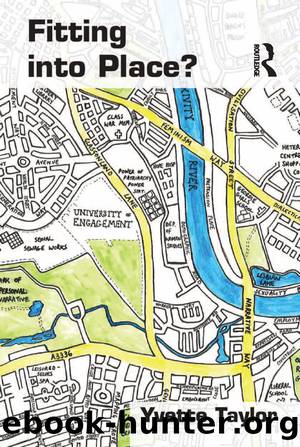Fitting into Place? by Yvette Taylor

Author:Yvette Taylor [Taylor, Yvette]
Language: eng
Format: epub
Tags: Social Science, Human Geography
ISBN: 9781317134893
Google: a4UHDAAAQBAJ
Publisher: Routledge
Published: 2016-04-15T06:02:19+00:00
Chapter 5
Fertile Spaces: Landscaping Gender
This chapter highlights the landscaping of gender where the âAngel of the Northâ and her changing public-private inhabitations are both utilised and rejected as (anti) nostalgic generational-gender troubles, embedded and embodied by differently classed women. Massey (2004) queries what she calls the âRussian doll modelâ of belonging where home and care are the nested beginnings of identity and âfitting-inâ, extending outwards from home to locality and so on, where there is
⦠a kind of accepted understanding that we care first for, and have responsibilities towards, those nearest in. There are two qualities of this geography which stand out: it is utterly territorial, and it proceeds outwards from the small and near at hand (Massey 2004: 9).
This close proximity â and the distances from it â deserves to be queried in order not to romanticise the local, or the âgood âGeordieâ womanâ. In the (re)making of the North East, women can be seen as upholding and challenging gendered and classed distances/proximities that are created in their âcaresâ. The logics and loyalties to these communities need to be troubled: time and place are bound up in constructions of family time as ârepro-normativeâ, creating a narrative of sacrifice for the future, via a hetero-domesticity (Skeggs 1997, Halberstam 2005, Taylor 2009). The place of families, as the proper place of children, women and the future of communities (and nations) is associated in ârhetorics of territoryâ, where womenâs material labour is effaced even as âmaps of loyalty and of affectâ hold up families as reference points of belonging and âfitting inâ (Massey 2004). Affective labour persists in these spaces as enduring cares, even as âoldâ patriarchal public/ private binaries of female housewife and male breadwinner have given way (Adkins 2002, Beynon 2005, McDowell et al. 2005). It would seem that some women are more on the map than others and that new-old ways are refigured in senses of familial, communal and individual âlossâ and âgainâ spatialised across everyday landscapes of the North East.
As has been noted, economic change â even regional âresilienceâ â can rapidly re-create rather than resolve gender and class polarisations, with women still clustering in low paid, part-time work and still struggling with ideologies of motherhood and care: âa widening of economic inequalities is generating a complex reworking of both class and gender practices in urban Britain todayâ (Bondi and Christie 2000: 340, see also Walby 2009, Jarvis et al. 2009). McDowell (2008) locates her analysis in shifting spatial relations, referring both to structural geography (e.g. the decline of heavy industries in peripheral areas in the UK) and to intimate and domestic geographies, where the empirical shape of these gendered-classed distributions depends on both the history of an area and its future pattern of economic growth. Place, labour and locality continue to exert an important influence upon social relations and the formation of gender and class identities in âlocal neighbourhood cultures and daily spaces of habitationâ (Nayak and Keily 2008: 106). That said, James (2009) notes that the
Download
This site does not store any files on its server. We only index and link to content provided by other sites. Please contact the content providers to delete copyright contents if any and email us, we'll remove relevant links or contents immediately.
Chaco's Northern Prodigies : Salmon, Aztec, and the Ascendancy of the Middle San Juan Region after AD 1100 by Paul F. Reed(379)
Digital International Relations by Unknown(375)
Law Enforcement Interpersonal Communication and Conflict Management by Brian Douglas Fitch(365)
Skilled interpersonal communication: Research, theory and practice, Fifth edition by Owen Hargie(355)
The Enduring Color Line in U.S. Athletics by Krystal Beamon Chris M. Messer(353)
Critical Perspectives on Human Security : Rethinking Emancipation and Power in International Relations by David Chandler; Nik Hynek(341)
EPSO CAST Political affairs EU policies: How to succeed in the selection procedure by Franco Reverte José María(329)
Evidence-Based Policy Making in Labor Economics by Hamermesh Daniel S.;Nottmeyer Olga K.;Nottmeyer Olga;King Sarah;King Sarah;King Sarah;(319)
Writing Public Policy - A Practical Guide to Communicating in the Policy Making Process by Catherine F. Smith(297)
Criminological Theory in Context by John Martyn Chamberlain(294)
Rothschild and Early Jewish Colonization in Palestine (Geographical Perspectives on the Human Past) by Ran Aaronsohn(292)
Positive Psychology and Spirituality in Counselling and Psychotherapy (Conflict, Ethics, and Spirituality, 12) by unknow(289)
Tibeton Yoga Its Secret Doc by Evans-Wentz(283)
Threshold Concepts in Women's and Gender Studies by Christie Launius Holly Hassel(279)
Social Problems, Social Issues, Social Science by James Wright(279)
Cognitive Development in Infancy and Childhood (Elements in Child Development) by Mary Gauvain(273)
Play in child development and psychotherapy: toward empirically supported practice by Sandra W. Russ(272)
Latin American Politics and Society by Gerardo L. Munck & Juan Pablo Luna(252)
The Arab Spring Abroad: Diaspora Activism against Authoritarian Regimes by Dana M. Moss(234)
